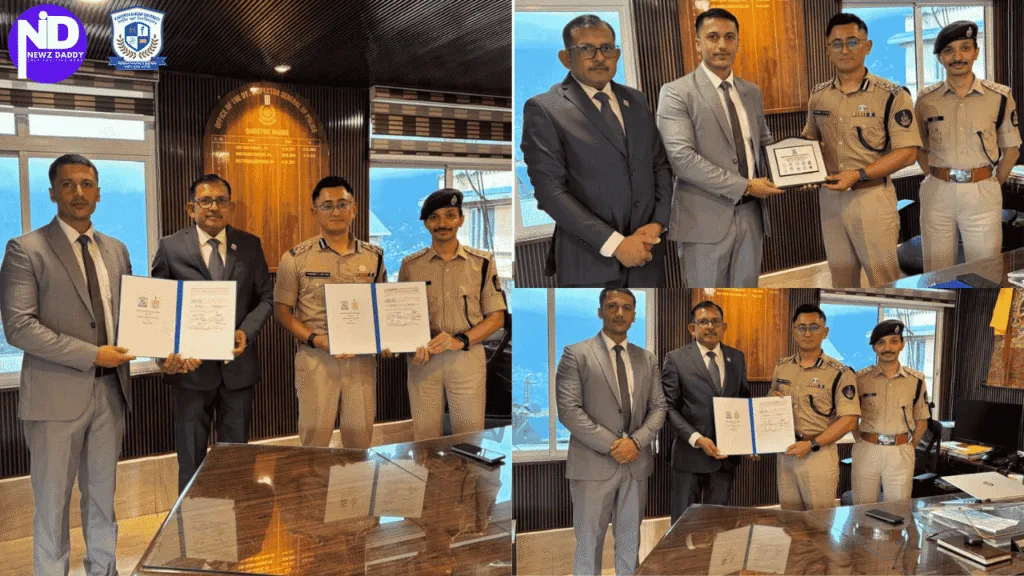RRU Sikkim Police Partnership Boosts Northeast Vision 2047
Newz Daddy Educational Updates
Partnership Strengthens Security Infrastructure Aligned with Home Minister’s Vision for Region’s Prosperity In a significant step toward realising the Home Minister’s ambitious vision of making Northeast India the country’s most prosperous region by 2047, Rashtriya Raksha University (RRU) has signed a comprehensive Memorandum of Understanding (MoU) and Affiliation and Accreditation agreement with Sikkim Police.
The vision for Northeast to be India’s most prosperous region by 2047 was stated by Home Minister Amit Shah at the North Eastern Council. He noted that violence in the Northeast has dropped by about 71% in the past decade and that infrastructure expansion has helped bridge gaps.RRU is India’s specialised university focusing on security, policing, forensics, cyber security, etc. Such MoUs with state police forces help spread their training and education to remote or hilly regions like Sikkim.
The strategic partnership, formalised today, directly supports the Home Minister’s declaration at the Northeast Council (NEC) that “By 2047, when India becomes fully developed, the Northeast will be the country’s most prosperous region.” This MoU represents a crucial investment in the security and policing infrastructure necessary to achieve this transformative vision. The NEC (North Eastern Council) is a statutory advisory body constituted under the NEC Act, 1971, which includes states like Sikkim. It promotes planning and coordination for development in those states. The statement about prosperity by 2047 is part of its recent plenary sessions.
Security infrastructure includes not just roads or stations but also training, legal systems, forensic labs, cyber forensics, etc. RRU already offers many programs in cybersecurity and digital forensics. Under this collaboration, RRU and Sikkim Police will jointly work on training, research, and education initiatives aimed at strengthening capacity and resilience in the region. The collaboration includes structured accreditation and affiliation activities, enabling Sikkim Police personnel to access nationally recognised training programs and academic courses.RRU runs postgraduate courses such as M.Sc. in Digital Forensics and Ph.D programmes in Cyber Security & Digital Forensics.
Accreditation and affiliation help ensure that the training the police personnel receive is recognised, standardised, and consistent with best practices all over India. Key areas of focus will include awareness and training programs on drug trafficking, counter-terrorism, tourism policing, cyber forensics, and disaster management. These initiatives are designed to build a robust, modern, and responsive policing framework aligned with emerging security challenges, while promoting community trust and preparedness.
Northeast India, including Sikkim, is sensitive to issues like cross-border drug trafficking due to porous borders. Strengthening awareness and training in that area is critical. Disaster management is especially important in Sikkim because of its geography—landslides, floods, and earthquakes are recurring risks. Having trained personnel and modern tools helps in quicker rescue and better disaster response.
There are certain other areas where both institutions will work together, like:
Building Capacity: Use workshops and specific training modules to improve the abilities and expertise of Sikkim Police officers.
RRU has a Directorate of Professional Development and Training (DPDT), which customises security, forensic, and policing training for various agencies.
Workshops help officers stay up to date on new laws (like cyber law), new tech (drones, surveillance analytics), and new crime patterns (cybercrime, online fraud).
Research and Development: Work together on studies meant to tackle today’s security issues and create cutting-edge policing strategies.
RRU has active research in cyber forensics, behavioural sciences, forensic investigations, etc. Its School of Behavioural Sciences & Forensic Investigations (SBSFI) works in this area.
Collaboration can help Sikkim Police bring local issues (terrain, culture, language) into research so solutions are tailor-made.
Technological Advancement: Encourage the use of cutting-edge tools in law enforcement, such as data analytics, forensics, and surveillance.
RRU’s SITAICS school already has labs for network security, penetration testing, malware analysis, etc.
Using data analytics in policing helps in predicting crime hotspots, optimising patrols, and faster detection of cyber threats.
Curriculum Development: Create and carry out educational initiatives and courses that are pertinent to the changing demands of Northeastern police enforcement.
RRU has PG Diploma courses and Master’s in Cyber Security & Digital Forensics. These can be adapted to the local needs of Sikkim (for example, tourism policing, mountain rescue, etc).
This means officers might get credit or certificates which are recognised, helping career growth.
Exchange of Expertise: Encourage RRU teachers, researchers, and Sikkim Police officials to share best practices and information.
Such exchange nurtures trust and helps in adapting central-level policies to local realities.
Also helps build networks between institutions and communities, which is good for policing transparency and community trust. This MoU marks a significant milestone in the shared commitment of RRU and Sikkim Police to advance the safety, security, and sustainable development of Northeast India as it works toward the Vision 2047 goals. Sustainable development means not just growth in GDP but also peace, trust, environmental preservation, and people’s well-being. Security is key to this. With growing threats like cybercrime, extremism, and climate disasters, collaboration with an institute like RRU helps ensure the Sikkim Police are prepared.
Must Read:
RRU Smart India Hackathon: Students Ready For Big Tech Challenge

